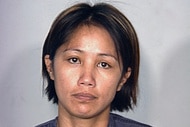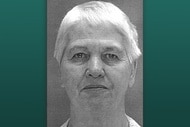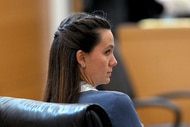Create a free profile to get unlimited access to exclusive videos, breaking news, sweepstakes, and more!
Why Was The Gabriel Fernandez Case So Personal For Prosecutor Jon Hatami?
“I think I became a DA for that case,” prosecutor Jon Hatami said after recounting his own childhood abuse.

The details of 8-year-old Gabriel Fernandez’s abuse were horrific — but to Los Angeles Deputy District Attorney Jon Hatami they were also personal.
Hatami was a victim of child abuse himself, surviving a “tough few years” of physical and verbal abuse at the hands of his father as a boy of just 4 or 5 years old.
“I had kind of a complicated childhood situation. My dad had really bad anger problems, and he would get really mad. He was abusive at times,” Hatami said in the upcoming Netflix documentary “The Trials of Gabriel Fernandez" premiering Wednesday.
Fernandez was killed in May 2013 after he was beaten, tortured and starved by his mother Pearl Sinthia Fernandez and her boyfriend Isauro Aguirre, allegedly because Aguirre believed the young boy was gay.
While prosecuting the case, Hatami recalled his own father’s explosive anger and the conflicting feelings of both fear and love he felt as a child.
“I remember numerous times being (pulled) up by my hair, (and my father) throwing me against the wall. But, I was most scared of the yelling. Just the sound of his yelling, I’d start crying. But God, I loved him. You know, it’s kind of hard to explain,” he said in the six-part series.
Hatami remains haunted by his own abuse and admitted to The Los Angeles Times that he was initially afraid to be a father himself. But he also draws on the powerful memories when advocating for justice on behalf of victims like Fernandez, who died after suffering shattered ribs and a cracked skull.
"I can never, like, compare anything that happened to me to any of my cases, including Gabriel. But at least a little bit of what I've been through, I could have some understanding,” he said in the documentary.
Hatami told The Times he believes he was meant to handle the prosecution against Pearl Sinthia Fernandez, the young boy’s mother, and her Aguirre, her boyfriend.
"I think I became a DA for that case,” he said. “I’ll never have another Gabriel.”
Just like Hatami’s own conflicted feelings as a boy, Gabriel had also struggled to reconcile the abuse he suffered with his affection for his mother. His mother allegedly shot him the face with a BB gun, allowed her boyfriend to mercilessly beat him, fed him cat feces and often forced him to sleep in a cabinet with a sock stuffed in his mouth.
Yet, Gabriel had still written a note to his mother telling her “I love you Mom and Gabriel is a good boy,” according to local station KABC.
"The letters he wrote, they break me because, you know, I feel that,” Hatami said as he held back tears. “So you see it and you're like ... no matter what they did to him, he wanted them to love him.”
Hatami's Own Childhood
Hatami grew up in Queens, New York and remembers that, at times, his father could be a fun guy until something minor would set him off and his entire demeanor would change, the LA Times reports.
“I had a really tough childhood — I’m a little broken,” Hatami later recalled to the Santa Clarita Valley Signal.
Hatami’s father told the Times he did raise his voice but denied physically abusing his son.
"That’s completely out of my character,” he said.
Hatami’s parents got divorced and he can still remember being asked by the judge who he wanted to live with—a question that just made him freeze.
“As a child, I think if you get abused, a lot of it is, you feel bullied and you feel, like, belittled and small and everybody's so big and you're so small and you want somebody to fight for you,” he said in the series.
The turbulence continued after Hatami’s mother was granted temporary custody of him and his younger brother and “kidnapped” them, taking them to Florida, he told the LA Times.
The family later relocated to California, as his father and the FBI continued to search for him.
Eventually, the family would be located after photos of the missing boys appeared in the Ladies Home Journal.
Hatami told the LA Times that his mother was given just “a slap on the wrist” for taking the boys.
Hatami would go on to enlist in the Army at 18 and later got his law degree in Nebraska before accepting a job as a civil attorney in Los Angeles County.
Two years later, he joined the Los Angeles County district attorney’s office where he's made a mark as one of three prosecutors assigned to a special complex child abuse unit.
He married his wife Roxanne, whom he met while she was working as a bailiff in the courthouse, and the couple have two children of their own.
But the job has taken a toll on the family.
Roxanne, who now works as a detective in the sheriff’s office, told the Times the Fernandez case turned the family’s home life “upside down,” as Hatami poured through the disturbing X-rays, medical records and detailed accounts of the abuse.
“He told me that he really had to put himself in Gabriel’s shoes. Like, ‘How did he feel?’” she said. “In doing that, he sacrificed a lot of himself.”
He also challenged the Los Angeles County Sheriff’s Department after learning that deputies had been to Fernandez’s home just months before he died but saw no signs of abuse and did not fill out paperwork that would have triggered a larger investigation, according to the LA Times—adding an additional level of stress for the family.
But the emotional turmoil and hard work would eventually pay off after Pearl Sinthia Fernandez agreed to plead guilty and was sentenced to life in prison. A jury found Isauro Aguirre guilty of first-degree murder and torture and sentenced him to death. Pearl Fernandez pleaded guilty to first-degree murder and to the special circumstance allegation of murder involving torture in 2018. She is serving out her sentence at Chowchilla State Women’s Prison in Central California.
“That case was so important. It was worth it,” Roxanne told the paper.
Hatami hopes to continue advocating against child abuse for others not so different from himself.
“I think everybody has to do their part,” he told KABC. “And it seems like some people aren’t doing their part.”
-Gina Tron contributed to this story.



























